面对文化冲击我们该做英语作文
如何面对文化冲击英语作文
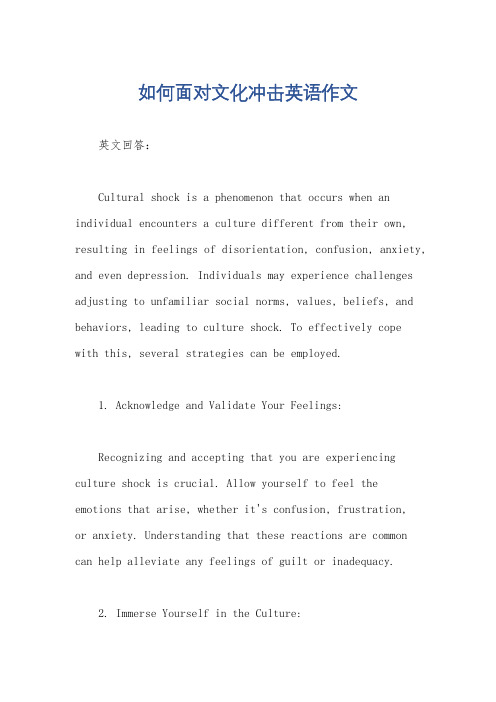
如何面对文化冲击英语作文英文回答:Cultural shock is a phenomenon that occurs when an individual encounters a culture different from their own, resulting in feelings of disorientation, confusion, anxiety, and even depression. Individuals may experience challenges adjusting to unfamiliar social norms, values, beliefs, and behaviors, leading to culture shock. To effectively copewith this, several strategies can be employed.1. Acknowledge and Validate Your Feelings:Recognizing and accepting that you are experiencing culture shock is crucial. Allow yourself to feel the emotions that arise, whether it's confusion, frustration,or anxiety. Understanding that these reactions are common can help alleviate any feelings of guilt or inadequacy.2. Immerse Yourself in the Culture:Actively engage with the new culture to gain a deeper understanding. Attend local events, participate intraditional activities, and engage in conversations with locals. The more you immerse yourself, the quicker you will adapt and develop cultural empathy.3. Seek Support and Connections:Connect with other individuals who have experienced culture shock or those from the new culture. They can provide invaluable support, understanding, and guidance.Join cultural organizations or clubs to meet like-minded people and learn from their experiences.4. Maintain a Positive Attitude:Approaching the new culture with a positive and open mindset can significantly influence your experience. Embrace the differences and view them as opportunities for growth and learning. Focus on the positive aspects of the new culture and appreciate the unique experiences it offers.5. Be Patient and Forgive Yourself:Adjusting to a new culture takes time and effort. Don't be hard on yourself if you make mistakes or feel overwhelmed at times. Be patient with the process and forgive yourself for any perceived shortcomings.6. Learn the Local Language:Making an effort to learn the local language cangreatly enhance your ability to communicate and understand the new culture. Even basic phrases can help you break down communication barriers and connect with locals on a deeper level.7. Practice Mindfulness:Pay attention to your thoughts and feelings throughout your experience. Identify any negative or overwhelming thoughts and challenge them with a more positive perspective. Practice mindfulness techniques to reducestress and anxiety while promoting resilience.8. Seek Professional Help if Needed:If you find yourself struggling to cope with culture shock, don't hesitate to seek professional help. A trained therapist or counselor can provide support, guidance, and coping mechanisms to help you navigate the challenges effectively.中文回答:文化冲击是人们接触到与自己不同的文化时所产生的现象,会导致迷茫、困惑、焦虑甚至抑郁等感受。
积极面对文化冲击英语作文
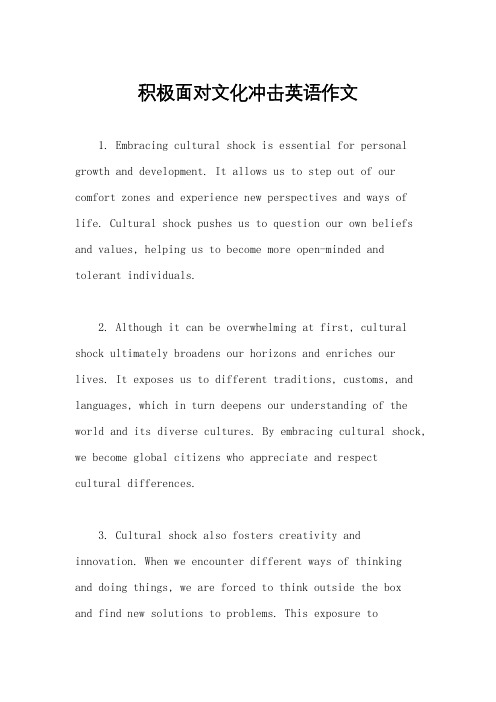
积极面对文化冲击英语作文1. Embracing cultural shock is essential for personal growth and development. It allows us to step out of our comfort zones and experience new perspectives and ways of life. Cultural shock pushes us to question our own beliefs and values, helping us to become more open-minded and tolerant individuals.2. Although it can be overwhelming at first, cultural shock ultimately broadens our horizons and enriches our lives. It exposes us to different traditions, customs, and languages, which in turn deepens our understanding of the world and its diverse cultures. By embracing cultural shock, we become global citizens who appreciate and respectcultural differences.3. Cultural shock also fosters creativity and innovation. When we encounter different ways of thinkingand doing things, we are forced to think outside the boxand find new solutions to problems. This exposure todiverse perspectives can spark inspiration and lead to breakthrough ideas and inventions.4. Moreover, cultural shock teaches us resilience and adaptability. It challenges us to navigate unfamiliar environments and situations, forcing us to develop coping mechanisms and problem-solving skills. These skills are not only valuable in dealing with cultural shock but also in other aspects of life, such as career challenges or personal relationships.5. It is important to note that cultural shock is not a one-time experience but a continuous process. As we encounter new cultures and immerse ourselves in different environments, we may face multiple instances of cultural shock. However, each experience builds upon the previous ones, making us more equipped to handle future challenges and adapt to new cultural contexts.6. Lastly, embracing cultural shock allows us to form meaningful connections with people from different backgrounds. By understanding and appreciating theircultures, we can bridge gaps and foster mutual respect and understanding. These connections not only enrich our personal lives but also contribute to a more harmonious and inclusive society.In conclusion, embracing cultural shock is crucial for personal growth, creativity, adaptability, and fostering meaningful connections. It allows us to become more open-minded, tolerant, and globally aware individuals. So, let us embrace cultural shock with open arms and embrace the opportunities it brings.。
对待文化冲击英文作文
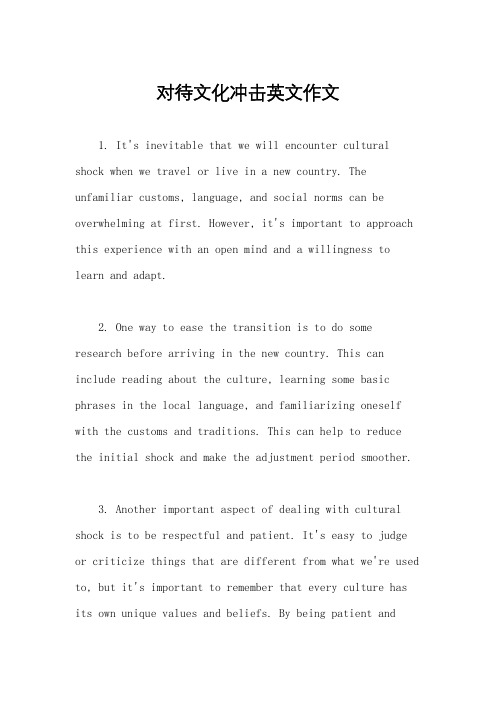
对待文化冲击英文作文1. It's inevitable that we will encounter cultural shock when we travel or live in a new country. The unfamiliar customs, language, and social norms can be overwhelming at first. However, it's important to approach this experience with an open mind and a willingness to learn and adapt.2. One way to ease the transition is to do some research before arriving in the new country. This can include reading about the culture, learning some basic phrases in the local language, and familiarizing oneself with the customs and traditions. This can help to reduce the initial shock and make the adjustment period smoother.3. Another important aspect of dealing with cultural shock is to be respectful and patient. It's easy to judge or criticize things that are different from what we're used to, but it's important to remember that every culture has its own unique values and beliefs. By being patient andopen-minded, we can learn to appreciate and respect these differences.4. Communication is also key in dealing with cultural shock. It's important to ask questions and seekclarification when we don't understand something, rather than assuming or making assumptions. This can help to avoid misunderstandings and foster better relationships with the local community.5. Finally, it's important to remember that cultural shock is a natural part of the process of adapting to a new culture. It may take time to fully adjust, but with an open mind, patience, and a willingness to learn, we can overcome the challenges and embrace the richness and diversity of the new culture.。
怎么克服文化冲击英文作文

怎么克服文化冲击英文作文It can be challenging to overcome cultural shock, especially when you are in a new country with different customs and traditions. One way to cope with this is to try to understand and appreciate the new culture, rather than comparing it to your own.It's important to keep an open mind and be willing to learn from the people around you. By immersing yourself in the local community and participating in their activities, you can gain a better understanding of their way of life.Making an effort to learn the language of the new culture can also help you to feel more integrated. Being able to communicate with the locals in their own language can break down barriers and help you to feel more at home.Seeking out support from others who have experienced cultural shock can be beneficial. They can offer advice and understanding, and it can be comforting to know that youare not alone in your feelings.Taking care of your physical and mental well-being is crucial during this time. Engaging in activities that you enjoy and finding ways to relax can help to reduce stress and anxiety.Finally, it's important to give yourself time to adjust. Cultural shock doesn't disappear overnight, but by being patient with yourself and allowing yourself to experience the ups and downs, you can eventually overcome it.。
中国如何面对文化冲击英语作文
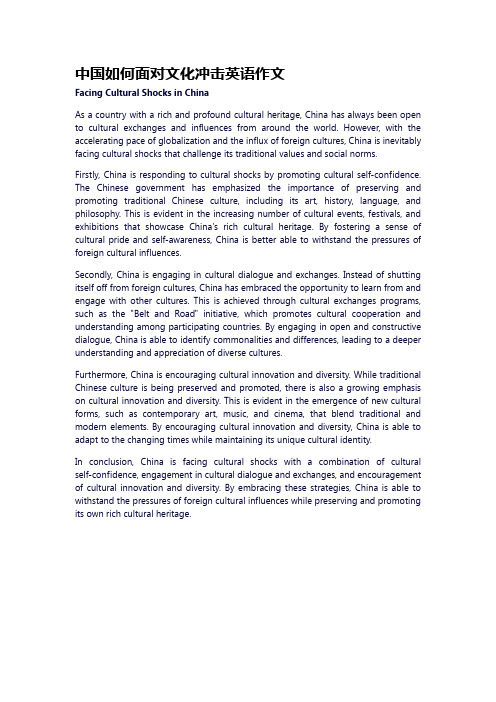
中国如何面对文化冲击英语作文Facing Cultural Shocks in ChinaAs a country with a rich and profound cultural heritage, China has always been open to cultural exchanges and influences from around the world. However, with the accelerating pace of globalization and the influx of foreign cultures, China is inevitably facing cultural shocks that challenge its traditional values and social norms. Firstly, China is responding to cultural shocks by promoting cultural self-confidence. The Chinese government has emphasized the importance of preserving and promoting traditional Chinese culture, including its art, history, language, and philosophy. This is evident in the increasing number of cultural events, festivals, and exhibitions that showcase China's rich cultural heritage. By fostering a sense of cultural pride and self-awareness, China is better able to withstand the pressures of foreign cultural influences.Secondly, China is engaging in cultural dialogue and exchanges. Instead of shutting itself off from foreign cultures, China has embraced the opportunity to learn from and engage with other cultures. This is achieved through cultural exchanges programs, such as the "Belt and Road" initiative, which promotes cultural cooperation and understanding among participating countries. By engaging in open and constructive dialogue, China is able to identify commonalities and differences, leading to a deeper understanding and appreciation of diverse cultures.Furthermore, China is encouraging cultural innovation and diversity. While traditional Chinese culture is being preserved and promoted, there is also a growing emphasis on cultural innovation and diversity. This is evident in the emergence of new cultural forms, such as contemporary art, music, and cinema, that blend traditional and modern elements. By encouraging cultural innovation and diversity, China is able to adapt to the changing times while maintaining its unique cultural identity.In conclusion, China is facing cultural shocks with a combination of cultural self-confidence, engagement in cultural dialogue and exchanges, and encouragement of cultural innovation and diversity. By embracing these strategies, China is able to withstand the pressures of foreign cultural influences while preserving and promoting its own rich cultural heritage.。
英文作文如何克服文化冲击
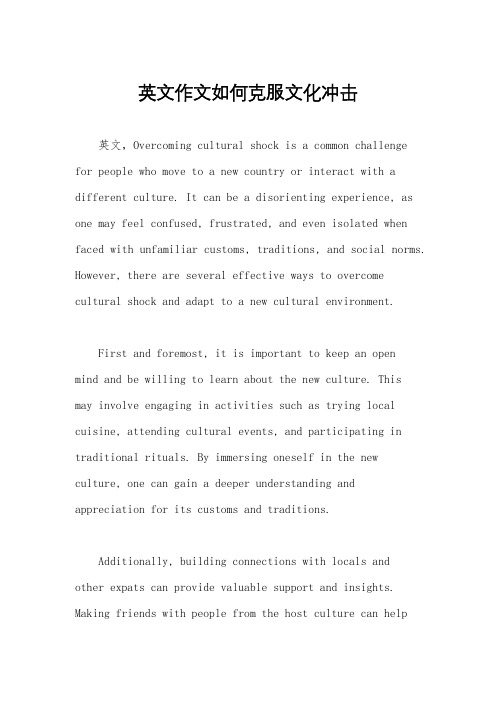
英文作文如何克服文化冲击英文,Overcoming cultural shock is a common challengefor people who move to a new country or interact with a different culture. It can be a disorienting experience, as one may feel confused, frustrated, and even isolated when faced with unfamiliar customs, traditions, and social norms. However, there are several effective ways to overcome cultural shock and adapt to a new cultural environment.First and foremost, it is important to keep an openmind and be willing to learn about the new culture. This may involve engaging in activities such as trying local cuisine, attending cultural events, and participating in traditional rituals. By immersing oneself in the new culture, one can gain a deeper understanding andappreciation for its customs and traditions.Additionally, building connections with locals andother expats can provide valuable support and insights. Making friends with people from the host culture can helpbridge the gap and provide opportunities to learn from their experiences. Similarly, connecting with other expats can create a sense of camaraderie and solidarity, as they may be going through similar challenges.Furthermore, seeking out resources and information about the new culture can also be beneficial. This may include reading books, watching documentaries, and taking language classes. Having a better understanding of the cultural context can help alleviate feelings of confusion and frustration.Lastly, maintaining a positive attitude and being patient with oneself is crucial in overcoming cultural shock. It is important to acknowledge that adjusting to a new culture takes time and effort, and it is okay to make mistakes along the way. By staying patient and resilient, one can gradually adapt to the new cultural environment.中文,克服文化冲击是一个常见的挑战,特别是对于那些搬到新的国家或与不同文化交流的人来说。
面对文化冲击措施英语作文
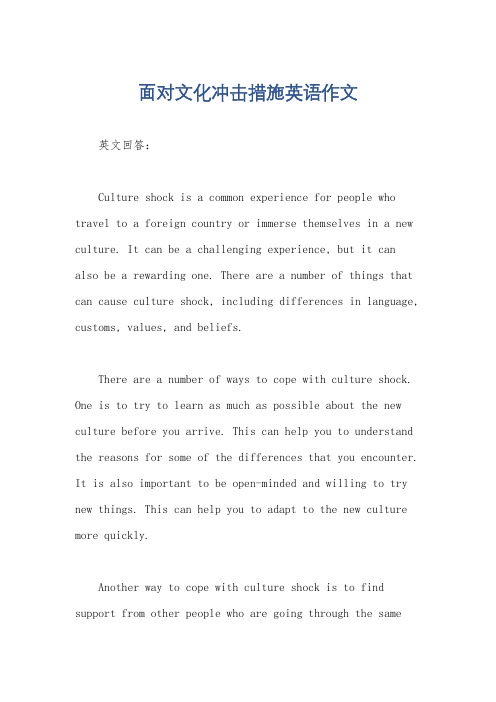
面对文化冲击措施英语作文英文回答:Culture shock is a common experience for people who travel to a foreign country or immerse themselves in a new culture. It can be a challenging experience, but it can also be a rewarding one. There are a number of things that can cause culture shock, including differences in language, customs, values, and beliefs.There are a number of ways to cope with culture shock. One is to try to learn as much as possible about the new culture before you arrive. This can help you to understand the reasons for some of the differences that you encounter. It is also important to be open-minded and willing to try new things. This can help you to adapt to the new culture more quickly.Another way to cope with culture shock is to find support from other people who are going through the sameexperience. This could include friends, family, or other travelers. Talking to others about your experiences can help you to feel less isolated and alone.Finally, it is important to remember that culture shock is a temporary experience. It will take time to adjust to the new culture, but eventually you will feel more comfortable and at home.中文回答:文化冲击是一种普遍存在于旅行到外国或沉浸在新文化中的人的经历。
英文作文如何克服文化冲击
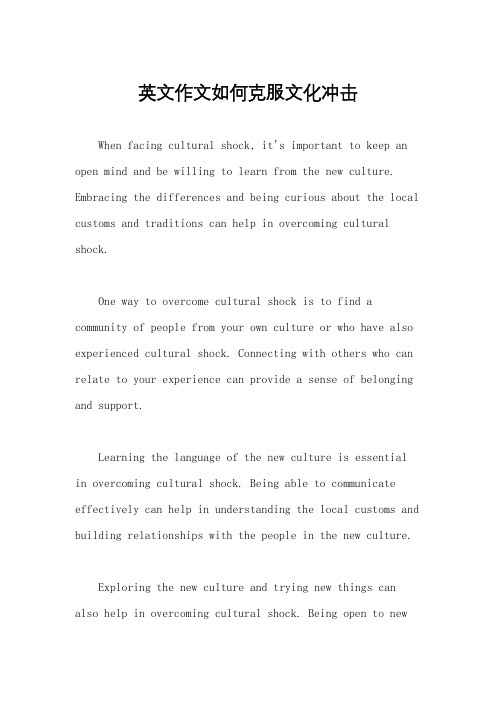
英文作文如何克服文化冲击When facing cultural shock, it's important to keep an open mind and be willing to learn from the new culture. Embracing the differences and being curious about the local customs and traditions can help in overcoming cultural shock.One way to overcome cultural shock is to find a community of people from your own culture or who have also experienced cultural shock. Connecting with others who can relate to your experience can provide a sense of belonging and support.Learning the language of the new culture is essential in overcoming cultural shock. Being able to communicate effectively can help in understanding the local customs and building relationships with the people in the new culture.Exploring the new culture and trying new things can also help in overcoming cultural shock. Being open to newexperiences and stepping out of your comfort zone can lead to a better understanding and appreciation of the new culture.It's important to take care of yourself while adjusting to a new culture. Practicing self-care, such as exercise, meditation, and maintaining a healthy diet, can help in managing the stress and anxiety that often comes with cultural shock.Seeking professional help, such as counseling or therapy, can also be beneficial in overcoming cultural shock. Talking to a professional can provide valuable support and guidance in navigating the challenges of adjusting to a new culture.。
文化冲击英文作文建议
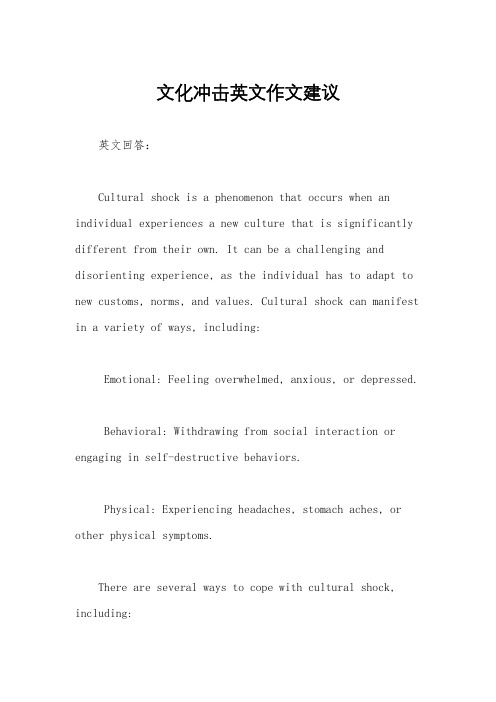
文化冲击英文作文建议英文回答:Cultural shock is a phenomenon that occurs when an individual experiences a new culture that is significantly different from their own. It can be a challenging and disorienting experience, as the individual has to adapt to new customs, norms, and values. Cultural shock can manifest in a variety of ways, including:Emotional: Feeling overwhelmed, anxious, or depressed.Behavioral: Withdrawing from social interaction or engaging in self-destructive behaviors.Physical: Experiencing headaches, stomach aches, or other physical symptoms.There are several ways to cope with cultural shock, including:Be open-minded and willing to learn. The more you know about the new culture, the better equipped you will be to navigate it.Seek out support from others. Talk to other people who have experienced cultural shock, or who can provide you with support and guidance.Take care of yourself. Make sure to get enough sleep, eat healthy foods, and exercise regularly.Don't be afraid to ask for help. If you are struggling to cope with cultural shock, don't hesitate to reach out to a mental health professional.中文回答:文化冲击是一种当一个人经历一个与自己文化截然不同的新文化时发生的现象。
你如何应对外国的文化冲击英语作文
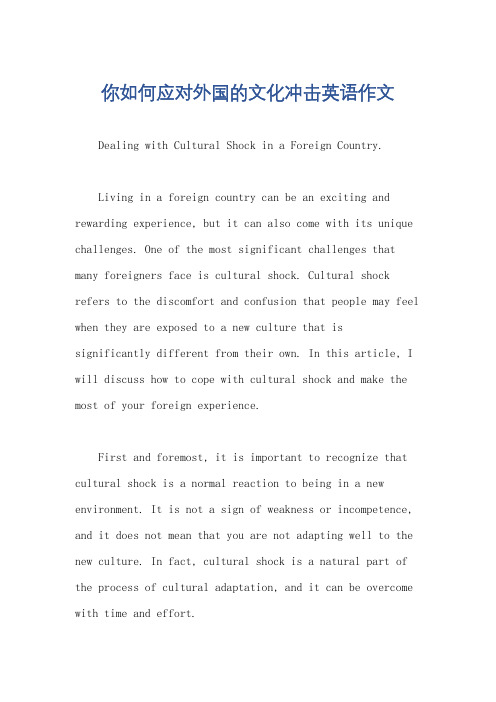
你如何应对外国的文化冲击英语作文Dealing with Cultural Shock in a Foreign Country.Living in a foreign country can be an exciting and rewarding experience, but it can also come with its unique challenges. One of the most significant challenges that many foreigners face is cultural shock. Cultural shock refers to the discomfort and confusion that people may feel when they are exposed to a new culture that issignificantly different from their own. In this article, I will discuss how to cope with cultural shock and make the most of your foreign experience.First and foremost, it is important to recognize that cultural shock is a normal reaction to being in a new environment. It is not a sign of weakness or incompetence, and it does not mean that you are not adapting well to the new culture. In fact, cultural shock is a natural part of the process of cultural adaptation, and it can be overcome with time and effort.One of the best ways to cope with cultural shock is to maintain an open and curious mindset. Try to embrace the new culture and see it as an opportunity to learn and grow. Avoid judging the new culture too harshly or comparing it unfavorably to your own. Instead, focus on understanding the values, beliefs, and customs of the new culture and appreciating the differences.Another helpful strategy is to connect with other people from your own culture. Having a support system of friends and family who understand your experiences and struggles can be invaluable. They can provide emotional support, practical advice, and a sense of familiarity and comfort in the new environment.However, it is also important to make an effort to engage with the local culture. This can be done by participating in local events and activities, trying local foods, and interacting with local people. Through these experiences, you will gain a deeper understanding of the culture and feel more connected to the community.In addition, it is helpful to have a plan for dealing with cultural shock. This plan should include strategiesfor coping with stress and anxiety, as well as goals for integrating into the new culture. For example, you might set a goal to learn a few basic phrases in the local language or to participate in a local cultural event each month. Having these goals will give you a sense of purpose and direction as you navigate the new culture.Lastly, it is important to remember that cultural shock is temporary. With time and effort, you will gradually adapt to the new culture and feel more comfortable and confident in your new environment. Be patient with yourself and don't expect to adjust overnight. Give yourself time to explore, learn, and grow in your new cultural home.In conclusion, cultural shock is a common challengethat foreigners may face when living in a new country. However, it is a normal and manageable part of the cultural adaptation process. By maintaining an open and curious mindset, connecting with others from your own culture,engaging with the local culture, and having a plan for dealing with cultural shock, you can overcome thischallenge and make the most of your foreign experience.With time and effort, you will adapt to the new culture and feel more comfortable and confident in your new environment.。
面对文化冲击我们该做英语作文
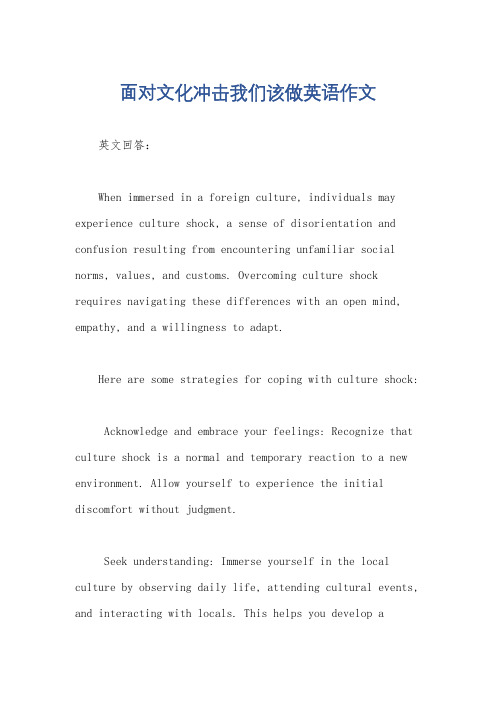
面对文化冲击我们该做英语作文英文回答:When immersed in a foreign culture, individuals may experience culture shock, a sense of disorientation and confusion resulting from encountering unfamiliar social norms, values, and customs. Overcoming culture shock requires navigating these differences with an open mind, empathy, and a willingness to adapt.Here are some strategies for coping with culture shock:Acknowledge and embrace your feelings: Recognize that culture shock is a normal and temporary reaction to a new environment. Allow yourself to experience the initial discomfort without judgment.Seek understanding: Immerse yourself in the local culture by observing daily life, attending cultural events, and interacting with locals. This helps you develop adeeper understanding of the underlying values and perspectives.Practice empathy: Try to understand the reasons behind unfamiliar practices and customs. Consider the historical and social context that has shaped them. Empathy fosters respect and reduces the likelihood of judgment.Be flexible and adapt: Recognize that your owncultural experiences and beliefs may not always be applicable. Be willing to adjust your behaviors and expectations to accommodate the norms of the new culture.Connect with others: Build relationships with locals and other expats who can provide support and guidance. Sharing experiences and perspectives helps you integrate into the new society.Engage in self-care: Take care of your physical and emotional well-being. Maintain a healthy routine, seek professional support if needed, and engage in activities that bring you joy.Remember your purpose: Recall the reasons why youchose to immerse yourself in a new culture. This canprovide motivation and resilience when facing challenges.中文回答:当我们身处异文化环境中,可能会经历文化冲击,即由于遭遇陌生的社会规范、价值观和风俗而产生的迷失和困惑感。
克服文化冲击英文作文
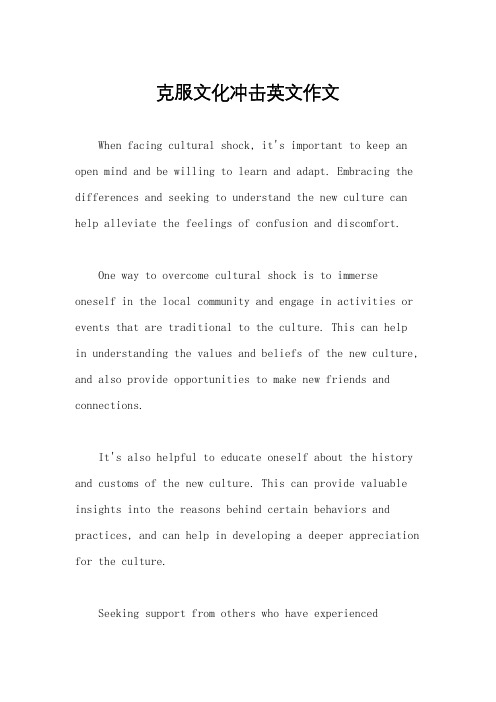
克服文化冲击英文作文When facing cultural shock, it's important to keep an open mind and be willing to learn and adapt. Embracing the differences and seeking to understand the new culture can help alleviate the feelings of confusion and discomfort.One way to overcome cultural shock is to immerse oneself in the local community and engage in activities or events that are traditional to the culture. This can helpin understanding the values and beliefs of the new culture, and also provide opportunities to make new friends and connections.It's also helpful to educate oneself about the history and customs of the new culture. This can provide valuable insights into the reasons behind certain behaviors and practices, and can help in developing a deeper appreciation for the culture.Seeking support from others who have experiencedcultural shock can be beneficial. Sharing experiences and seeking advice from those who have successfully adapted to a new culture can provide comfort and guidance during the transition.Maintaining a positive attitude and being patient with oneself is crucial when overcoming cultural shock. It's important to remember that adaptation takes time, and it's okay to feel overwhelmed at times. Being kind to oneself and allowing for mistakes can make the process smoother.Finally, keeping in touch with one's own culture and traditions can provide a sense of grounding and comfort during the transition. Celebrating festivals, cooking traditional meals, or simply connecting with fellow expats can help in maintaining a sense of identity while embracing a new culture.。
对付文化冲击的英文作文
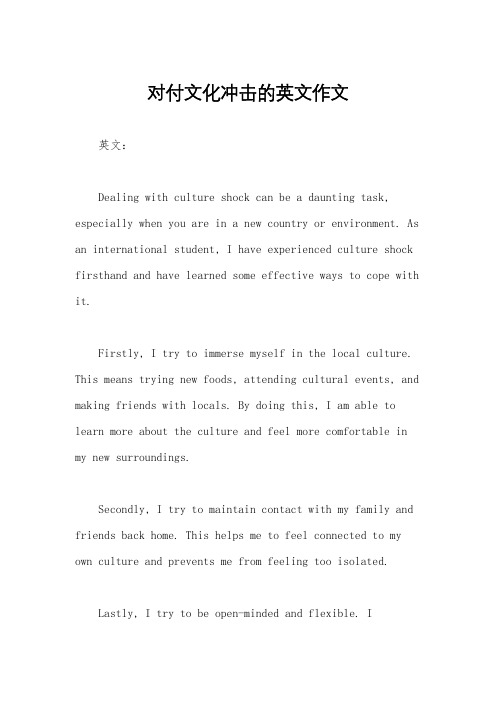
对付文化冲击的英文作文英文:Dealing with culture shock can be a daunting task, especially when you are in a new country or environment. As an international student, I have experienced culture shock firsthand and have learned some effective ways to cope with it.Firstly, I try to immerse myself in the local culture. This means trying new foods, attending cultural events, and making friends with locals. By doing this, I am able to learn more about the culture and feel more comfortable in my new surroundings.Secondly, I try to maintain contact with my family and friends back home. This helps me to feel connected to my own culture and prevents me from feeling too isolated.Lastly, I try to be open-minded and flexible. Iunderstand that not everything will be the same as it is in my home country, and I try to embrace the differences instead of resisting them.中文:应对文化冲击可能是一项艰巨的任务,特别是当你身处一个新的国家或环境时。
如何面对文化冲击英语作文

如何面对文化冲击英语作文Facing Cultural ShockCultural shock is a common experience when individuals are exposed to a new and unfamiliar cultural environment. It can be overwhelming and disorienting, but it is also an opportunity for growth and understanding. Here are some ways to face cultural shock and make the most of the experience.Firstly, it is important to acknowledge and accept that cultural differences exist. Every culture has its own unique values, beliefs, and ways of doing things. Understanding and respecting these differences is essential for overcoming cultural shock.Secondly, it is helpful to maintain an open mind and a sense of curiosity. Approach new experiences with a positive attitude and a willingness to learn. Be patient with yourself and others as you navigate through the unfamiliar territory.Thirdly, it is beneficial to seek support and make connections with others. Talk to people who have had similar experiences or who can offer advice and guidance. Joiningsocial groups or activities can also help you meet new people and feel more integrated into the community.Lastly, it is important to take care of yourself. Cultural shock can be emotionally and physically demanding. Make sure to get enough rest, eat well, and stay hydrated. Take time to explore your new environment and find things that bring you joy and comfort.In conclusion, facing cultural shock is a challenging but rewarding experience. By acknowledging differences, maintaining an open mind, seeking support, and taking care of yourself, you can overcome the initial difficulties and grow as an individual. Embrace the opportunity to learn and understand new cultures, and you will find that the world is a much richer and more interesting place because of it.。
如何处理文化冲击的英语作文
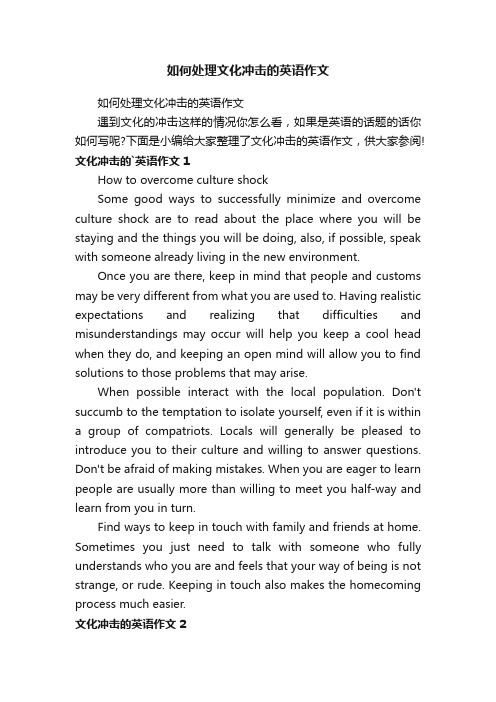
如何处理文化冲击的英语作文如何处理文化冲击的英语作文遇到文化的冲击这样的情况你怎么看,如果是英语的话题的话你如何写呢?下面是小编给大家整理了文化冲击的英语作文,供大家参阅! 文化冲击的`英语作文1How to overcome culture shockSome good ways to successfully minimize and overcome culture shock are to read about the place where you will be staying and the things you will be doing, also, if possible, speak with someone already living in the new environment.Once you are there, keep in mind that people and customs may be very different from what you are used to. Having realistic expectations and realizing that difficulties and misunderstandings may occur will help you keep a cool head when they do, and keeping an open mind will allow you to find solutions to those problems that may arise.When possible interact with the local population. Don't succumb to the temptation to isolate yourself, even if it is within a group of compatriots. Locals will generally be pleased to introduce you to their culture and willing to answer questions. Don't be afraid of making mistakes. When you are eager to learn people are usually more than willing to meet you half-way and learn from you in turn.Find ways to keep in touch with family and friends at home. Sometimes you just need to talk with someone who fully understands who you are and feels that your way of being is not strange, or rude. Keeping in touch also makes the homecoming process much easier.文化冲击的英语作文2If there is anything special about my neighborhood,it is that there is a beautiful orchard and all the residents are good neighbors.Far removed from any heavy traffic flows,this neighborhood is also a place of peace and quiet.I can still picture to myself how I spent my girlhood happily here.Besides playing boisterous ball games on the ground we children also played in the trees of the orchard and picked whatever fruits we could lay our hands on.Each of us had his of her own pets,such as dogs,guinea pigs,pigeons and even butterflies.Fast friends we were in those years,Our parents often gathered in one place for a chit-chat after supper and we children were rapt listeners even though we did not really understand what they were talking about.They were never harsh on us kids.Our next-door neighbor Mrs.Wang was especially liked by us because she habitually sent us cookies.Our own grandma was an excellent story-teller and we children often fell under the spell of her fascinating stories.Mr.Chang was also an unforgettable character.Whenever we saw him he was singing and his baby face and soft voice pleased us all.This is my neighborhood,a world unto its own which has remained largely unchanged in so many years.It is nice to live here and my neighbors will surely agree with me.文化冲击的英语作文3How to Deal with Culture ShockCulture shock, hard to escape when getting into a new unfamiliar surrounding, may come out as a big problem for a new visitor and breaks down his wonderful expectations about this new country.Anyway,there are always some solutions to arm ourselves to handle the uncomfortable culture shock.Since you has grasped the opportunity of going abroad, in the first place, it’s necessary and beneficial to refer to essentialaspects about your destination, likeweather, food and culture. Get prepared for what may come around the corner in the new place and make relative responses previously, culture shock probably seems not so overwhelming.Meanwhile, it is the positive attitude that makes a great difference.Optimistshave the powerful sword to overcome difficulties and get theirselves adapted to changing situations. When culture shock appears, consider it as a hurdle to easily pass through instead of a really big challenge.In addition, seeking assistance and accompany from local citizens ,or even compatriotswho have the same experience, is an excellent shelter to withstand uneasy culture shock. More advices, more strength.It is adorable to seek relief in this very new world.。
对文化冲击的看法英语作文

对文化冲击的看法英语作文(中英文版)Cultural shock, an inevitable phenomenon in today"s globalized world, is an intriguing and double-edged sword.On one hand, it broadens our horizons by exposing us to diverse customs and ideas; on the other hand, it can lead to confusion and discomfort as we struggle to adapt to unfamiliar surroundings.文化冲击,在当今全球化的世界中不可避免的现象,它是一把既有趣又双刃剑。
一方面,它通过让我们接触不同的习俗和观念来拓宽我们的视野;另一方面,当我们努力适应不熟悉的环境时,它可能导致困惑和不适。
From my perspective, embracing cultural shock is essential for personal growth and cross-cultural understanding.It challenges us to step out of our comfort zones, fostering open-mindedness and resilience.Moreover, navigating through cultural differences can lead to valuable life lessons and enriched experiences.在我看来,接受文化冲击对个人成长和文化间理解至关重要。
它挑战我们走出舒适区,培养开放的心态和适应力。
此外,游走于文化差异之间可以带来宝贵的生活经验和丰富的体验。
面对文化冲击我们该做英语作文

全文分为作者个人简介和正文两个部分:作者个人简介:Hello everyone, I am an author dedicated to creating and sharing high-quality document templates. In this era of information overload, accurate and efficient communication has become especially important. I firmly believe that good communication can build bridges between people, playing an indispensable role in academia, career, and daily life. Therefore, I decided to invest my knowledge and skills into creating valuable documents to help people find inspiration and direction when needed.正文:面对文化冲击我们该做英语作文全文共3篇示例,供读者参考篇1How We Should Face Cultural ShocksIn our rapidly globalizing world, cultural exchange and interaction have become inevitable. As we traverse different regions, immerse ourselves in diverse societies, or evenencounter foreign influences within our own communities, the phenomenon of cultural shock is bound to occur. This term refers to the disorientation, confusion, and unease experienced when encountering unfamiliar customs, values, and norms that diverge from one's own cultural upbringing.Navigating cultural shocks can be a daunting task, but it is a challenge we must confront head-on. Failing to do so can lead to misunderstandings, conflicts, and missed opportunities for personal growth. Therefore, it is crucial that we develop strategies to effectively cope with and embrace these cultural differences.Firstly, we must cultivate an open and inquisitive mindset. Instead of dismissing or judging unfamiliar practices as strange or inferior, we should approach them with curiosity and a willingness to learn. By suspending our preconceptions and biases, we can gain valuable insights into the rich tapestry of human diversity. Asking respectful questions, engaging in dialogues, and actively seeking to understand the historical, social, and philosophical underpinnings of different cultures can foster mutual understanding and appreciation.Secondly, we should embrace flexibility and adaptability. Cultural shocks often stem from our rigid adherence to our owncultural norms and expectations. By recognizing that there are multiple valid ways of viewing and experiencing the world, we can develop the capacity to adapt to new environments and situations. This does not necessarily mean abandoning our own cultural identities, but rather expanding our horizons and finding common ground amidst diversity.Furthermore, we must cultivate empathy and emotional intelligence. Cultural shocks can elicit strong emotional reactions, ranging from confusion and frustration to anxiety and even fear. By acknowledging and validating these emotions, we can better manage our responses and avoid knee-jerk reactions or rash judgments. Developing empathy – the ability to understand and share the feelings of others – can help us navigate cultural differences with greater sensitivity and respect.In addition to personal growth, effectively navigating cultural shocks can have far-reaching implications for fostering global cooperation and peace. By recognizing the inherent worth and dignity of all cultures, we can break down barriers, bridge divides, and promote mutual understanding. This, in turn, can pave the way for productive collaborations, diplomatic resolutions, and the creation of inclusive societies that celebrate diversity.However, it is crucial to acknowledge that cultural shocks can sometimes reveal deeply problematic practices or values that violate fundamental human rights or ethical principles. In such instances, we must strike a delicate balance between respect for cultural diversity and standing firm against injustice or oppression. Through open and respectful dialogue, we can strive to find common ground and work towards positive change while preserving the essence of cultural traditions.In conclusion, navigating cultural shocks is a complex and ongoing process that requires patience, empathy, and a genuine commitment to understanding and appreciating the richness of human diversity. By cultivating open-mindedness, flexibility, emotional intelligence, and a willingness to engage in respectful dialogue, we can not only mitigate the discomfort of cultural shocks but also unlock opportunities for personal growth, global cooperation, and the creation of a more inclusive and harmonious world.篇2How We Should Face Cultural ClashesWe live in an increasingly globalized world where interactions between different cultures have become the normrather than the exception. With modern transportation and technology, people can travel to the farthest corners of the globe and connect with others from vastly different backgrounds. While this cross-cultural exchange has brought many benefits, allowing us to learn from diverse perspectives and broaden our horizons, it has also led to cultural clashes and misunderstandings that can strain relationships between groups.As students preparing to enter this multicultural landscape, it's crucial that we develop strategies for navigating cultural differences respectfully and productively. After all, the ability to bridge cultural divides will be an invaluable skill in our future careers and social lives. So, how exactly should we approach these cultural clashes when they inevitably arise?First and foremost, we must cultivate an attitude of openness and curiosity towards cultures different from our own. Too often, people react to unfamiliar customs or beliefs with fear, hostility or dismissiveness. However, this closed-minded approach only fuels conflict and prevents any meaningful understanding. Instead, we should approach other cultures with a willingness to learn and an eagerness to gain new perspectives.By making a sincere effort to understand the context, history, and reasoning behind different cultural practices, we'll be betterequipped to appreciate their significance rather than judge them from a narrow, ethnocentric viewpoint. This open-mindedness doesn't mean we have to abandon our own values or beliefs, but it does require us to recognize that our way of life isn't the only valid one.Secondly, effective cross-cultural communication is key to preventing and resolving cultural conflicts. Language barriers and divergent communication styles can easily lead to misinterpretations that snowball into larger issues. As students, we should prioritize learning about different cultural norms surrounding communication, such as degrees of directness, nonverbal cues, personal space preferences, and attitudes towards conflict.More importantly, we need to develop crucial skills like active listening, clarifying ambiguities, and exhibiting patience and emotional intelligence when communicating across cultures. Simply being aware that our cultural lenses shape how we give and receive information can go a long way in promoting mutual understanding.Furthermore, we must be willing to challenge our own assumptions and biases about other cultures. Even with the best of intentions, we all hold unconscious prejudices shaped by ourupbringings and environments. When interacting with other cultures, we may find ourselves making snap judgments or harboring stereotypical beliefs without being fully aware of it.To overcome this, we should strive to identify our own cultural biases and examine them critically. We can do this through self-reflection, research, and dialogue with others from different backgrounds. Once we've acknowledged our preconceived notions, we can work on deconstructing them and replacing them with more accurate, nuanced understandings.Ultimately, the most effective way to face cultural clashes may be to reframe the way we view them entirely. Rather than seeing differences as threats or sources of conflict, we should treat them as opportunities for growth, learning, and strengthening the bonds between diverse groups. By embracing the richness that cultural diversity brings to our world, we can transform cultural clashes into cultural collaboration.This transition won't happen overnight, but as students,we're in a unique position to spearhead this shift in perspective for future generations. In our classes, campuses, and communities, we can model how to respectfully discuss and negotiate cultural differences. We can immerse ourselves in other cultures through literature, art, food, and personalconnections. And we can advocate for greater cross-cultural understanding and inclusion in our societies.Of course, facing cultural clashes will always involve some level of discomfort as we step outside our cultural comfort zones. There may be times when we feel confused, offended, or challenged by other belief systems. However, if we approach these situations with humility, empathy, and a sincere desire to find common ground, we'll be far better equipped to turn cultural divides into cultural bridges.The world is becoming increasingly interconnected, making cross-cultural competence not just an asset but a necessity. As students poised to become the next generation of leaders, entrepreneurs, and global citizens, we have a pivotal role to play in shaping how our societies navigate cultural differences. By embodying openness, enhancing our cross-cultural communication, examining our biases, and reframing cultural clashes as opportunities, we can help build a more unified, tolerant, and cooperative world for all.篇3How Should We Respond to Cultural Clashes?Our world is becoming increasingly interconnected and globalized. With modern technology and ease of travel, we are exposed to diverse cultures, customs, and viewpoints from across the globe on a daily basis. While this cultural exchange can be immensely enriching, broadening our horizons and helping us appreciate our differences, it can also lead to clashes and conflicts arising from contrasting values and belief systems. How should we, as students growing up in this multicultural era, navigate these cultural tensions? In my opinion, the answer lies in cultivating open-mindedness, empathy, and a willingness to engage in respectful dialogue.One of the biggest challenges we face in the realm of cultural clashes is overcoming our inherent tendency to view our own culture as the "norm" and anything diverging from it as "strange" or "wrong". From a young age, we are conditioned by our family, community, and society to adopt certain values, traditions, and ways of being that are deemed acceptable and natural within our cultural context. Anything contradicting these ingrained norms can trigger knee-jerk reactions of discomfort, judgment, or even hostility.However, it's crucial for us to recognize that our culture is simply one among myriad equally valid and rich culturaltapestries woven by the diverse peoples of our world. No single culture can claim universal superiority or moral high ground –each one is a product of its unique historical, geographical, and social circumstances, shaped by the lived experiences and worldviews of its people. By approaching cultural differences with an open and inquisitive mindset, we can unlock a deeper understanding and appreciation for the beautiful diversity that exists within our global human family.Empathy is another key ingredient in fostering harmonious intercultural relationships. Too often, cultural clashes arise from a failure to grasp the deeper contexts, motivations, and emotional underpinnings that inform the beliefs and practices of different cultures. Instead of dismissing or condemning unfamiliar customs as "bizarre" or "backward", we should strive to understand the reasoning and significance behind them from the perspective of those who hold them dear.For instance, certain cultural traditions that may seem oppressive or discriminatory to an outsider's eye could, in fact, hold profound symbolic or spiritual meaning for the people practicing them. By making a genuine effort to walk in their shoes, to understand their histories and lived realities, we cancultivate a deeper sense of compassion and respect, even if we don't necessarily agree with or adopt those practices ourselves.Empathy also involves acknowledging and addressing the power imbalances and historical injustices that have shaped the dynamics between different cultures. Many cultural conflicts stem from legacies of colonialism, oppression, and marginalization, where dominant cultures have systematically suppressed or devalued the traditions and identities of minority or indigenous groups. Addressing these deep-rooted inequities and trauma requires a willingness to listen to and amplify the voices of those who have been historically silenced or oppressed.Ultimately, the key to navigating cultural clashes lies in open and respectful dialogue. Instead of shutting down or attacking differing perspectives, we should create safe spaces where people from diverse backgrounds can come together to share their stories, express their viewpoints, and engage in constructive discourse aimed at finding common ground and mutual understanding.Such dialogues should be grounded in a spirit of humility, acknowledging that no single culture or individual holds a monopoly on truth or wisdom. We must be willing to challenge our own assumptions, biases, and preconceptions, and remainopen to having our worldviews expanded and transformed through meaningful interactions with those who see the world through different lenses.At the same time, these dialogues should not shy away from addressing difficult or contentious topics. Cultural clashes often arise from deeply rooted disagreements over fundamental issues like gender roles, religious beliefs, or ethical principles. While we may not always reach consensus on these complex matters, engaging in respectful and nuanced discussions can help us better understand the rationale and contexts behind differing viewpoints, fostering greater mutual respect and coexistence.In addition to interpersonal dialogues, we should also encourage and participate in broader public discourse and debates around cultural issues. Whether through academic forums, community events, or digital platforms, these discussions can help raise awareness, promote cross-cultural understanding, and shape more inclusive and equitable policies and practices within our societies.Of course, navigating cultural clashes is not always easy, and there will inevitably be situations where certain cultural practices or beliefs clash with fundamental human rights or ethical principles. In such cases, we must be willing to take a principledstand against practices that cause harm or infringe upon the dignity and autonomy of individuals, regardless of cultural justifications.However, even in these challenging scenarios, our approach should be rooted in empathy, open communication, and a genuine desire to find ethical and respectful resolutions that uphold universal human rights while still acknowledging and preserving the positive aspects of diverse cultural identities.As students growing up in an increasingly interconnected world, it is our responsibility to actively engage with these complex cultural dynamics and strive to be agents of positive change. By embracing open-mindedness, empathy, and respectful dialogue, we can transform cultural clashes into opportunities for mutual growth, understanding, and the celebration of our rich human tapestry.Instead of erecting walls of division and mistrust, let us build bridges of compassion and connection that allow us to learn from and enrich one another, creating a more harmonious and inclusive global community. The path may not be easy, but by walking it together with open hearts and minds, we can forge a future where our cultural differences are celebrated as sources ofbeauty and wisdom, rather than flashpoints for conflict and intolerance.。
你如何应对外国的文化冲击英语作文
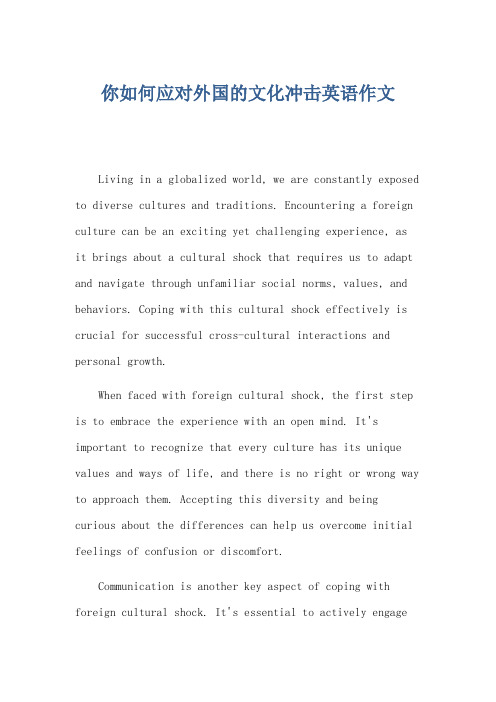
你如何应对外国的文化冲击英语作文Living in a globalized world, we are constantly exposed to diverse cultures and traditions. Encountering a foreign culture can be an exciting yet challenging experience, asit brings about a cultural shock that requires us to adapt and navigate through unfamiliar social norms, values, and behaviors. Coping with this cultural shock effectively is crucial for successful cross-cultural interactions and personal growth.When faced with foreign cultural shock, the first step is to embrace the experience with an open mind. It's important to recognize that every culture has its unique values and ways of life, and there is no right or wrong way to approach them. Accepting this diversity and being curious about the differences can help us overcome initial feelings of confusion or discomfort.Communication is another key aspect of coping with foreign cultural shock. It's essential to actively engagewith the local community, ask questions, and seek clarification whenever necessary. This not only helps us understand the cultural norms better but also fosters meaningful connections with people from different backgrounds.Flexibility and adaptability are also crucial skills when dealing with foreign cultural shock. We may encounter situations where our own cultural practices and beliefs clash with those of the host culture. In such cases, it's important to remain flexible and willing to adjust our behavior and attitude to fit the local context. This does not mean compromising our own values, but rather finding a balance that respects both cultures.Lastly, it's important to take care of our own well-being during the process of cultural adaptation. Moving to a new culture can be stressful, and it's essential to prioritize our mental and emotional health. Engaging in activities that bring us joy, such as exercise, meditation, or simply spending time in nature, can help us cope with the stress and maintain a positive mindset.In conclusion, coping with foreign cultural shock requires an open mind, effective communication, flexibility, adaptability, and self-care. By approaching new cultureswith curiosity and respect, we can not only enrich our own lives but also contribute to the growth and understandingof global communities.**应对外国文化冲击**在全球化的世界中,我们不断接触到各种文化和传统。
面对文化冲击措施英语作文
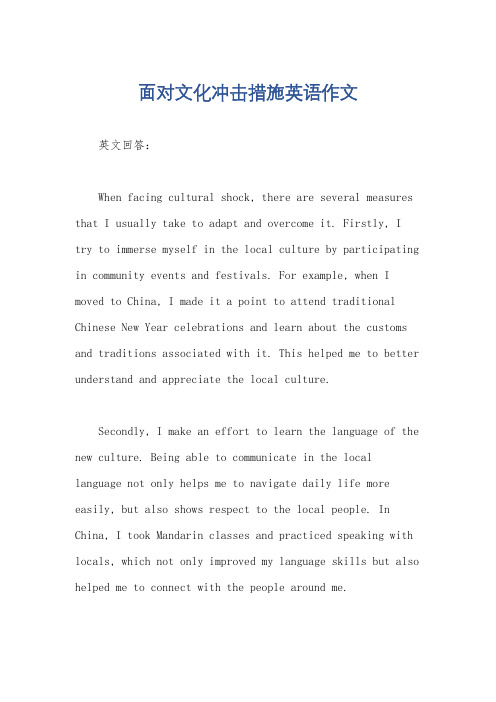
面对文化冲击措施英语作文英文回答:When facing cultural shock, there are several measures that I usually take to adapt and overcome it. Firstly, Itry to immerse myself in the local culture by participating in community events and festivals. For example, when I moved to China, I made it a point to attend traditional Chinese New Year celebrations and learn about the customs and traditions associated with it. This helped me to better understand and appreciate the local culture.Secondly, I make an effort to learn the language of the new culture. Being able to communicate in the local language not only helps me to navigate daily life more easily, but also shows respect to the local people. In China, I took Mandarin classes and practiced speaking with locals, which not only improved my language skills but also helped me to connect with the people around me.Lastly, I seek out a support network of both locals and expats who have experienced similar cultural shock. Havinga community of people who understand what I'm going through and can offer advice and support has been invaluable in helping me to adjust to a new culture.中文回答:面对文化冲击时,我通常会采取一些措施来适应和克服。
- 1、下载文档前请自行甄别文档内容的完整性,平台不提供额外的编辑、内容补充、找答案等附加服务。
- 2、"仅部分预览"的文档,不可在线预览部分如存在完整性等问题,可反馈申请退款(可完整预览的文档不适用该条件!)。
- 3、如文档侵犯您的权益,请联系客服反馈,我们会尽快为您处理(人工客服工作时间:9:00-18:30)。
面对文化冲击我们该做英语作文英文回答:
Facing cultural shock can be a challenging experience for anyone. It can be overwhelming to suddenly find
yourself in a new environment with different customs, traditions, and ways of thinking. However, I believe that there are ways to cope with and even embrace cultural differences.
One way to deal with cultural shock is to keep an open mind and be willing to learn from the new culture. For example, when I first moved to a different country, I was initially taken aback by the way people greeted each other with a kiss on the cheek. In my culture, a handshake is the norm. Instead of dismissing this custom as strange, I decided to embrace it and learn more about the significance behind it. This not only helped me adapt to the new culture but also allowed me to form deeper connections with the locals.
Another way to handle cultural shock is to seek support from others who have gone through similar experiences. When I felt homesick and out of place in a new country, I reached out to expat communities and online forums where I could connect with others who understood what I was going through. Having a support system of people who can relate to your struggles can make a world of difference in adjusting to a new culture.
Ultimately, facing cultural shock is an opportunity for personal growth and self-discovery. By stepping out of our comfort zones and embracing new experiences, we can broaden our perspectives and gain a deeper understanding of the world around us.
中文回答:
面对文化冲击可能是一种具有挑战性的体验。
突然发现自己处于一个拥有不同习俗、传统和思维方式的新环境中可能会让人感到不知所措。
然而,我相信有方法来应对甚至拥抱文化差异。
处理文化冲击的一种方法是保持开放的心态,愿意从新文化中学习。
例如,当我第一次搬到一个不同国家时,我最初对人们用亲吻脸颊来打招呼的方式感到吃惊。
在我的文化中,握手是常规。
我决定不将这种习俗视为奇怪,而是决定接受它,并了解其背后的意义。
这不仅帮助我适应了新文化,还让我能够与当地人建立更深层次的联系。
处理文化冲击的另一种方法是寻求与经历过类似经历的人的支持。
当我在一个新的国家感到思乡和格格不入时,我联系了外籍社区和在线论坛,与那些理解我经历的人建立联系。
拥有一个可以理解你困境的人的支持系统可以在适应新文化方面产生巨大的差异。
最终,面对文化冲击是一个个人成长和自我发现的机会。
通过走出我们的舒适区,接受新的经历,我们可以拓宽我们的视野,更深入地了解周围的世界。
